The SSD Anthology: Understanding SSDs and New Drives from OCZ
by Anand Lal Shimpi on March 18, 2009 12:00 AM EST- Posted in
- Storage
PCMark Vantage
Next up is PCMark Vantage, another system-wide performance suite. For those of you who aren’t familiar with PCMark Vantage, it ends up being the most real-world-like hard drive test I can come up with. It runs things like application launches, file searches, web browsing, contacts searching, video playback, photo editing and other completely mundane but real-world tasks. I’ve described the benchmark in great detail before but if you’d like to read up on what it does in particular, take a look at Futuremark’s whitepaper on the benchmark; it’s not perfect, but it’s good enough to be a member of a comprehensive storage benchmark suite. Any performance impacts here would most likely be reflected in the real world.
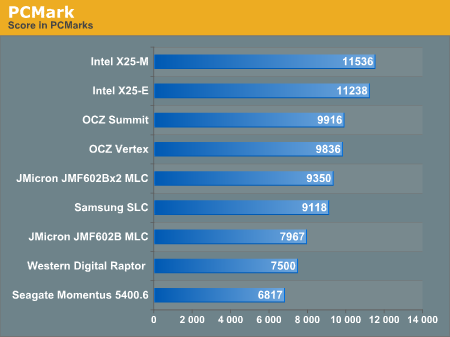
If you've paid attention to the synthetic tests from the previous pages, the results here should make sense. The Intel drives take the top two spots followed by the two OCZ drives, then the JMicron and conventional HDDs take up the rear.
While PCMark does do a great job of measuring disk performance, it doesn't seem to stress random write performance as much, allowing the JMicron drives to relax a bit.
Now let's look at the individual test suites:
The memories suite includes a test involving importing pictures into Windows Photo Gallery and editing them, a fairly benign task that easily falls into the category of being very influenced by disk performance.
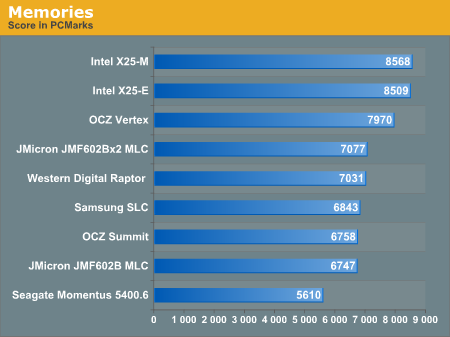
The TV and Movies tests focus on on video transcoding which is mostly CPU bound, but one of the tests involves Windows Media Center which tends to be disk bound.
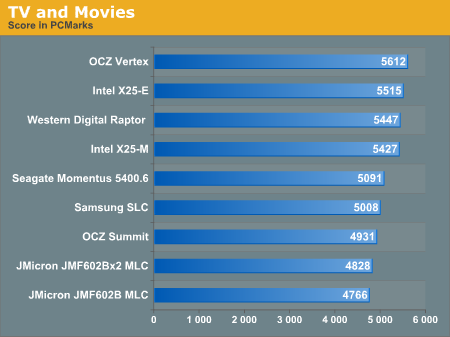
SSDs won't always dominate and in many cases they won't offer tangible improvements over a fast hard drive.
The gaming tests are very well suited to SSDs since they spend a good portion of their time focusing on reading textures and loading level data. All of the SSDs dominate here, but as you'll see later on in my gaming tests the benefits of an SSD really vary depending on the game. Take these results as a best case scenario of what can happen, not the norm.
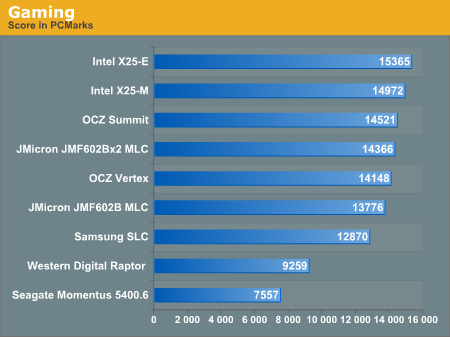
In the Music suite the main test is a multitasking scenario: the test simulates surfing the web in IE7, transcoding an audio file and adding music to Windows Media Player (the most disk intensive portion of the test).
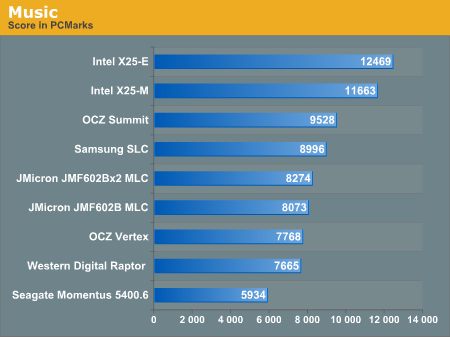
The Communications suite is made up of two tests, both involving light multitasking. The first test simulates data encryption/decryption while running message rules in Windows Mail. The second test simulates web surfing (including opening/closing tabs) in IE7, data decryption and running Windows Defender.

I love PCMark's Productivity test; in this test there are four tasks going on at once, searching through Windows contacts, searching through Windows Mail, browsing multiple webpages in IE7 and loading applications. This is as real world of a scenario as you get and it happens to be representative of one of the most frustrating HDD usage models - trying to do multiple things at once. There's nothing more annoying than trying to launch a simple application while you're doing other things in the background and have the load take seemingly forever.
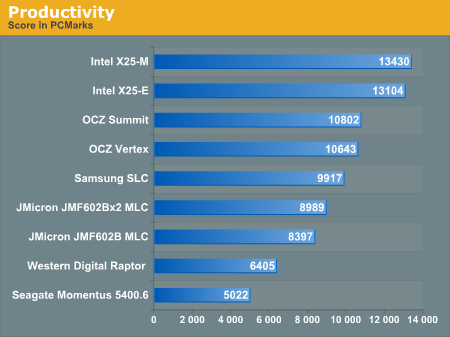
The results here are the best characterization of my personal experience with the drives. The Intel drives are the fastest, a good 25% faster than the Summit or Vertex. Next up are the OCZ drives, with the Vertex dangerously close to the Summit. The older Samsung SLC is next in the standings, followed by the JMicron drives. There's a healthy combination of reads and writes going on here which benefits all of the SSDs, including the less desirable ones.
The final PCMark Vantage suite is HDD specific and this is where you'll see the biggest differences between the drives:
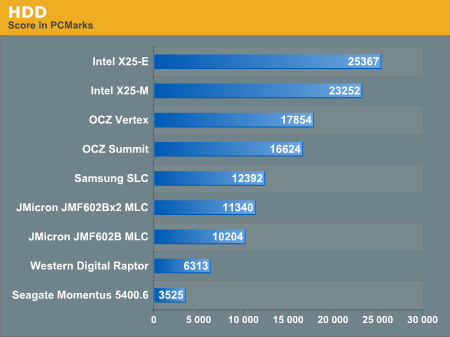
Again we're seeing the sort of breakdown we'd expect. The Intel drives come out ahead, while the Vertex is the best bang for your buck.










250 Comments
View All Comments
strikeback03 - Thursday, March 19, 2009 - link
If you get Newegg's specials, one of the codes is for the 30GB for $103 with a $20MIR, so $83 with shipping if the rebate comes through. At the size I would want (~120) the Super Talent undercuts the OCZ slightly.Does anyone know if you can install the firmware of one maker to another maker's SSD? For example, assuming both the Ultradrive ME and the Vertex use the same Indilinx controller, and say Super Talent chose to release it with the firmware which optimizes for higher sequential speeds, would the user be able to choose the firmware which optimizes for less latency?
Testtest - Wednesday, March 18, 2009 - link
Ah, no editing?!A-Data's "300 plus" SSD also uses the Indilinx controller.
vailr - Wednesday, March 18, 2009 - link
"The Anatomy of a SSD" should instead read: "The Anatomy of an SSD"Flunk - Wednesday, March 18, 2009 - link
Yes, because S is a vowel...abudd - Wednesday, March 18, 2009 - link
Assuming SSD = "es-es-dee" then "an SSD" is right. If it *sounds* like a vowel, use "an".JarredWalton - Wednesday, March 18, 2009 - link
Yes, *but* SSD could also be read as "Solid State Drive" instead of "ess ess dee", in which case you would say "a SSD". I tend to read it as "ess ess dee", but Anand thinks of those letters as "Solid State Drive".Potato, potato, tomato, tomato... let's call the whole thing off!
Azsen - Thursday, March 19, 2009 - link
When reading acronyms you're supposed to think of them as the letters, i.e. when you see RAM, you think "ram" straight off not Random Access Memory. When you see "IBM" you think "eye bee emm" not International Business Machines etc etc. It would take ages to read an article if you had to stop and think out all the full wording of acronyms as you're reading them.I'm going with the correction of "Anatomy of an SSD". Correct English fullstop.
JarredWalton - Thursday, March 19, 2009 - link
By your comment, you suggest two different things, and that's really okay. That was my point: when you see "RAM" you probably thing "ram" as in the animal... not "Are A Em". You say "a RAM stick" not "an RAM stick". I'd guess most people think of SATA as "Ess A Tee A", but if you talk to most computer techs that are in the know, it's "say-te" so you would say "a SATA drive".And you know, I'm sure plenty of people will agree with the correct way of saying SATA, and that's perfectly okay. English really is a very flexible thing - particularly in the tech world - and rarely is there an "always right" way of saying things. If Anand wants to say "a SSD" and others want to say "an SSD", I'm not going to try to declare one group or the other correct. They both are, depending on your viewpoint.
"I believe the world is neither black nor white, but only shades of gray."
Pythias - Friday, March 20, 2009 - link
Can't have gray without black and white.7Enigma - Wednesday, March 18, 2009 - link
HAHAHA. What a tool. I love it when people critique grammar.....and get it wrong.